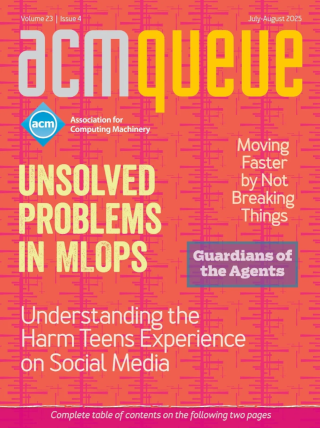
Extensible Programming for the 21st Century:
Is an open, more flexible programming environment just around the corner?
In his keynote address at OOPSLA ’98, Sun Microsystems Fellow Guy L. Steele Jr. said, “From now on, a main goal in designing a language should be to plan for growth.” Functions, user-defined types, operator overloading, and generics (such as C++ templates) are no longer enough: tomorrow’s languages must allow programmers to add entirely new kinds of information to programs, and control how it is processed. This article argues that next-generation programming systems can accomplish this by combining three specific technologies.
Fuzzy Boundaries: Objects, Components, and Web Services:
It’s easy to transform objects into components and Web services, but how do we know which is right for the job?
If you are an object-oriented programmer, you will understand the code snippet, even if you are not familiar with the language (C#, not that it matters). You will not be surprised to learn that this program will print out the following line to the console: woof.
How Not to Write Fortran in Any Language:
There are characteristics of good coding that transcend all programming languages.
There’s no obfuscated Perl contest because it’s pointless.
Kode Vicious: The Return:
A koder with attitude, KV answers your questions. Miss Manners he ain’t.
Dear KV, Whenever my team reviews my code, they always complain that I don’t check for return values from system calls. I can see having to check a regular function call, because I don’t trust my co-workers, but system calls are written by people who know what they’re doing--and, besides, if a system call fails, there isn’t much I can do to recover. Why bother?
Languages, Levels, Libraries, and Longevity:
New programming languages are born every day. Why do some succeed and some fail?
In 50 years, we’ve already seen numerous programming systems come and (mostly) go, although some have remained a long time and will probably do so for: decades? centuries? millennia? The questions about language designs, levels of abstraction, libraries, and resulting longevity are numerous. Why do new languages arise? Why is it sometimes easier to write new software than to adapt old software that works? How many different levels of languages make sense? Why do some languages last in the face of “better” ones?
Linguae Francae:
Is programming language a misnomer?
Many linguists are still busy trying to reconstruct the single ur-language presumed to have evolved over untold millennia into the thousands of human tongues - alive and dead, spoken and written - that have since been catalogued and analyzed. The amazing variety and complexity of known languages and dialects seems, at first parse, to gainsay such a singular seed.
Self-Healing in Modern Operating Systems:
A few early steps show there’s a long (and bumpy) road ahead.
Driving the stretch of Route 101 that connects San Francisco to Menlo Park each day, billboard faces smilingly reassure me that all is well in computerdom in 2004. Networks and servers, they tell me, can self-defend, self-diagnose, self-heal, and even have enough computing power left over from all this introspection to perform their owner-assigned tasks.
A Conversation with Alan Kay:
Big talk with the creator of smalltalk - and much more
When you want to gain a historical perspective on personal computing and programming languages, why not turn to one of the industry’s preeminent pioneers? That would be Alan Kay, winner of last year’s Turing Award for leading the team that invented Smalltalk, as well as for his fundamental contributions to personal computing. Kay was one of the founders of the Xerox Palo Alto Research Center (PARC), where he led one of several groups that together developed modern workstations (and the forerunners of the Macintosh), Smalltalk, the overlapping window interface, desktop publishing, the Ethernet, laser printing, and network client-servers.



